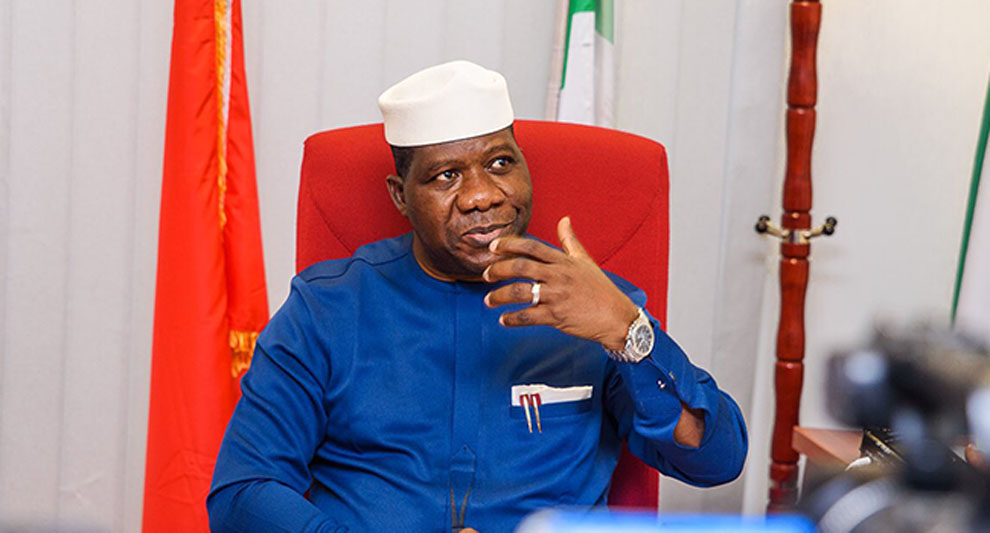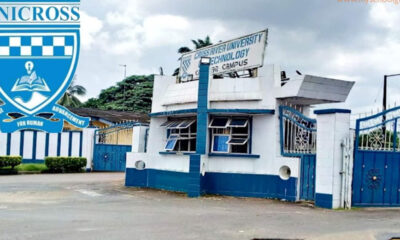News
Fuel sells for N2,500/litre black market as scarcity persists

Fuel sells for N2,500/litre black market as scarcity persists
Nigerians continue to bemoan the immense hardship they endure as a result of the statewide fuel shortage, which has made conducting business and other activities extremely challenging.
Commuters in Sokoto state said most filling stations are locked under the guise that they lack product to dispense, while black marketers are selling a litre of fuel between N2,000 and N2,500 across the metropolis, Channels TV reported.
Some residents, speaking with a reporter, called on the government to intervene to bring the situation under control so as not to degenerate.
They said the situation has started affecting business activities and making life difficult for people as the black market price of N2,500 per litre is becoming scarce, and this is bringing business and other activities to a standstill in the metropolis.
READ ALSO:
- Coastal highway: Minister present as demolition of Landmark Beach begins
- Landmines kill 5 JTF members, others wounded on Borno highway
- Chelsea in dramatic come back dent Aston Villa top-four hope
Chronicle NG reported that the Nigerian National Petroleum Company Limited (NNPC Ltd) has blamed the fuel queues that have resurfaced in Lagos, Abuja, and other states of the Federation on “logistics issues.”
However, NNPC Limited declared that the issues had been resolved.
“The Nigerian National Petroleum Company Limited (NNPC Ltd) wishes to clarify that the tightness in the supply of Premium Motor Spirit currently being experienced in some areas across the country is as a result of logistics issues and that they have been resolved,” the company said in a statement on Thursday evening.
“It also wishes to reiterate that the prices of petroleum products are not changing.”
NNPCL called on Nigerians to “avoid panic buying as there is a sufficiency of products in the country.”
Fuel sells for N2,500/litre black market as scarcity persists
News
British High Commission shuns Prince Harry, Meghan ceremonies in Nigeria

British High Commission shuns Prince Harry, Meghan ceremonies in Nigeria
Prince Harry and Meghan Markle’s visit to Nigeria has stirred up disquiet at the British High Commission in Abuja, as their presence went unacknowledged by relevant officials.
Despite the couple’s arrival in the populous nation and various welcoming activities, including meetings with military authorities and dignitaries, the British High Commission’s social media handles remained silent on their visit.
British High Commissioner to Nigeria, Richard Montgomery, clarified in an interview that the visit was in a private capacity and not arranged or facilitated by the commission. Hence, they were not representing the UK government’s work during their time in Nigeria.
During their visit to Kaduna, Prince Harry emphasized the importance of sports in the rehabilitation of wounded soldiers, focusing on meeting with Nigerian armed forces veterans.
READ ALSO:
- Soldiers killing: Okuama returnees collapse on seeing destroyed homes
- Why I claimed Ooni is my father – Man recants, apologises (+ VIDEO)
- Fuel scarcity will be over soon, days Senate leader
The couple’s decision to step down as senior royals in 2020, amidst frustrations over media intrusion and restrictions on developing their brand, “SussexRoyal,” was highlighted. They retained their titles but relinquished their royal highness status and Harry gave up his military titles.
Allegations surfaced regarding Prince Harry’s absence from a flight that carried other royal family members to visit Queen Elizabeth II before her passing. Reports suggest an argument ensued due to Harry’s insistence on bringing Meghan Markle to Balmoral, causing him to miss the flight.
The visit to Nigeria served as an opportunity for Prince Harry and Meghan Markle to engage with wounded veterans and promote rehabilitation efforts, despite the absence of official acknowledgment from the British High Commission.
British High Commission shuns Prince Harry, Meghan ceremonies in Nigeria
News
Soldiers killing: Okuama returnees collapse on seeing destroyed homes

Soldiers killing: Okuama returnees collapse on seeing destroyed homes
On returning to Okuama-Ewu community in Ughelli South Local Government Area, Delta State, following the withdrawal of the Nigerian Army, many residents, particularly mothers, collapsed upon seeing their homes in ruins.
A report by Vanguard which visited the community revealed a distressing scene as some residents experienced a sudden rise in blood pressure upon witnessing the extent of the destruction, requiring hours to recover. Amidst the chaos, returning villagers expressed bewilderment and sorrow over their situation.
Sixty-five-year-old Maria Adam, who fled Okuama-Ewu in March only to return in May, described her shock, saying, “On arrival when I saw the level of destruction, I fainted and was revived because I suffered hypertension.” She recounted the loss of her belongings and appealed for government assistance, expressing uncertainty about rebuilding their lives.
READ ALSO:
- Why I claimed Ooni is my father – Man recants, apologises (+ VIDEO)
- Fuel scarcity will be over soon, days Senate leader
- Man shoots stepmom trying to hug him during graduation ceremony
Similarly, Vero Joseph, a 68-year-old farmer, shared her dismay upon seeing the devastation, stating, “On arrival at the community and seeing the devastation, I fell terribly sick; nothing is left here.” She detailed the destruction of homes and essential items, emphasizing the challenges of starting anew but expressed a preference for returning to her hometown over seeking refuge elsewhere.
Fifty-two-year-old farmer Florence Ekiroro collapsed at the jetty overwhelmed by the realization of their homelessness, saying, “I collapsed at the jetty because we have become homeless.” She described the loss of essential belongings and rejected the idea of relocating to an IDP camp, citing the unfavorable conditions compared to their community.
Victoria Paul, a 58-year-old trader and farmer, recounted her ordeal, stating, “On arrival and seeing the gravity of damages, I fainted but was revived.” She lamented the destruction of her provisions business and personal belongings, despite finding solace in her community and beginning fishing to sustain her family.
Grace Okoye, a 55-year-old trader and farmer, expressed deep distress over the loss of her possessions, including her children’s academic documents and savings. She said, “On return, I feel very distressed and because everything I have had been destroyed. What pained me most were my children’s results and my building. I lost my boxes of wrappers and N200,000 cash in the house.
Soldiers killing: Okuama returnees collapse on seeing destroyed homes
News
Fuel scarcity will be over soon, says Senate leader

Fuel scarcity will be over soon, says Senate leader
Senate Leader Opeyemi Bamidele provided reassurance to Nigerians that the ongoing fuel crisis will soon be resolved, expressing this commitment during an interview at the Oil Technology Conference in Houston, Texas.
Bamidele emphasized the legislature’s dedication to addressing fuel scarcity and long queues at filling stations, highlighting plans to engage additional private-sector entities in constructing new refineries.
“The Senate is working to ensure that more private-sector players are licensed to own and operate refineries. This is to support other smaller ones that are springing up in several parts of the country.
READ ALSO:
- Man shoots stepmom trying to hug him during graduation ceremony
- Binance runs into trouble in Canada, fined $4.38m
- Anxiety as another aircraft skids off Lagos airport runway
“In addition to licensing new refinery operators, the Federal Government and Senate are working to ensure that the existing refineries are turned around with repairs and replacement of parts carried out where necessary,” he said.
Bamidele said the Senate had received an assurance from the Nigerian National Petroleum Company Limited that two of its refineries in Warri and Port Harcourt would come on stream before the end of the year.
He also noted that the commitment to licensing new refinery operators and revitalising existing refineries remained vital for increasing domestic oil production.
Opeyemi maintained that the focus was to ensure that Nigeria meets its OPEC production quota.
Fuel scarcity will be over soon, says Senate leader
-

 metro2 days ago
metro2 days agoCleric allegedly sets wife’s house ablaze following prayer disagreement in Ekiti
-

 metro3 days ago
metro3 days agoTragedy as generator fumes kills mother, child in Delta
-

 metro2 days ago
metro2 days agoYour husband is not your partner, he is the head – Daddy Freeze tells Nigerian women
-

 metro2 days ago
metro2 days agoLandlord arrested for impregnating tenant’s teenage daughter
-

 Africa2 days ago
Africa2 days agoCivil societies, Togo president on war path over new constitution eliminating elections
-

 metro3 days ago
metro3 days agoJust in: Many residents burnt to death in Lagos explosion
-

 Education3 days ago
Education3 days agoUNICROSS workers jubilate over sack of vice chancellor
-

 metro3 days ago
metro3 days agoJust in: EFCC arraigns ex-court registrar over N3.8m fraud






















